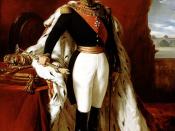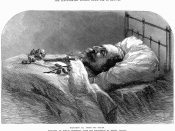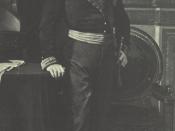In order to assess how far Napoleon III's liberalising of the Second Empire was an original aim or expedient, one has to establish a number of things, first an 'expedient' in this sense means that Napoleon III was pushed into liberalising the Empire by his circumstances rather than planning to liberalise the Empire from the beginning i.e. an 'original aim'. Secondly, there is much debate about Napoleon III and how his actions should be interpreted as the title of Samuel M Osgood's attempt to draw together the various assessments of him suggests; "Napoleon III; Buffoon, Modern Dictator or Sphinx". This is mainly due to a large void of knowledge about Napoleon III because he did not keep official papers or journals, as he had never been brought up in this way. Very often many of his ministers were not consulted about his decisions, for example Napoleon III negotiated the Pact of Plombières himself without consulting his foreign minister.
Napoleon III played his cards close to his chest. Without knowing Napoleon III's perspective and the reasons why he made the decisions he did, it is even harder to try and assess him.
Prior to the first set of liberal reforms in the early 1860s Louis ruthlessly repressed opposition and in the wake of his coup there were 26,884 arrests of political opponents. He also 'gagged' the press with new Press Laws in February 1852. From then on all publications were subject to government approval; journals could be suspended and suppressed for repeatedly attacking the regime, and those who were accused of press offences faced trial without jury. Political meetings were banned and the Corps Legislatif deprived of almost all its powers. "The elections were significant only in that they acted as a barometer for measuring the amount of opposition to the...


